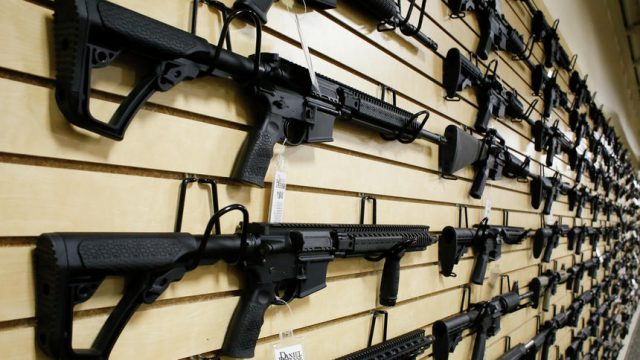Blaming Guns for Suicides Does a Disservice to Suicide Prevention Efforts

A wall of AR- 15’s is seen Thursday, Oct. 5, 2017, at Bill’s Gun Shop & Range, Fargo. Michael Vosburg / Forum Photo Editor
My last Sunday print column suggested that we could save more lives in America with better suicide prevention efforts than with tougher gun control policy.
To support this contention, I pointed out that most deaths in America resulting from a gun shot wound are self inflicted. In any given year, about 60 percent to 70 percent of gun deaths are suicides.
Proponents of gun bans and other control efforts don’t like that distinction. They like to give the public the impression that most gun deaths are the result of things like mass shootings or gun violence. But when the fact emerges, they fall back on arguing that suicides are more likely because of the presence of firearms.
[mks_pullquote align=”right” width=”300″ size=”24″ bg_color=”#ffffff” txt_color=”#000000″]The problem with these arguments is that they suppose Americans kill each other, and even themselves, because they have better access to guns than people in other countries. This is ludicrous.[/mks_pullquote]
This is utter baloney.
Still, my column has been called out today in a couple of letters to the editor.
Reader Steve Rodvold criticizes me because I used a report from the anti-gun Brady Campaign as the basis for my numbers on gun use in suicides but ignored that political group’s dubious conclusion that the presence of guns increases suicide rates.
Dr. Charles Christianson argues that the relationship between gun ownership and suicide is obvious. “In fact, the U.S. has by far the highest rate of gun ownership and of gun deaths of any industrialized nation, and even for the other nations there is a strong correlation between ownership and death rates,” he writes. “And among states in the U.S. there is also a correlation between rates of gun ownership and gun deaths.”
The problem with these arguments is that they suppose Americans kill each other, and even themselves, because they have better access to guns than people in other countries.
This is ludicrous. A contention that should be mocked as the sort of shallow analysis we might get from an elementary student, not taken seriously as a valid argument among adults.
If America’s love of guns means Americans are more likely to commit suicide, then why does our country rank so far down the list in international suicide rates?
Here are the 2015 suicide rates per 100,000 population among OECD countries (source):
Gun-loving Americans come in between Sweden and Austria, which is interesting.
Sweden has very restrictive gun laws, and ranks 27th in the world in terms of guns per 100 citizens. Austria, meanwhile, has some of the loosest gun laws in Europe and ranks 12th in the world in terms of guns per 100 citizens. The United States defines keeping and bearing arms as a constitutionally protected civil right and is first in the world in guns per 100 citizens by a country mile.
Norway, meanwhile, ranks 9th in the world in terms of gun ownership rates yet has a suicide rate below the OECD average. Japan and Korea, which have some of the highest suicide rates in the world, have gun laws so restrictive that private ownership of firearms is almost non-existent.
How can we say there is a causal relationship between gun ownership and suicide when this data shows no such connection? It’s clear that variables other than gun ownership factor into world suicide rates.
Here at home gun control nuts who argue that firearms cause higher suicide rates will point to higher suicide rates in more gun-friendly states, but is that a causal relationship? Are gun laws, and gun ownership rates, the deciding variable? Because there is also a relationship between higher rates of suicide in living in rural areas which also just happen to be the most gun-friendly areas of our country.
Beyond geography, it’s also true that suicide is most prevalent among white males. Gun ownership is also most prevalent among white males. Can we conclude, then, that white men commit suicide at higher rates because they have guns? Or are guns just the tool they choose to do something inspired by other factors?
That, I think, is the most important question to ask. The how of suicide matters a lot less than the why.
But I understand why we do this.
Why people decide to engage in violence, whether it’s against themselves or others, is a complicated question without a lot of easy answers. Debating gun control is easier, plus it’s palatable red meat for the politicians to shovel at their various constituencies.
But that doesn’t mean we should let this debate be shallow.





